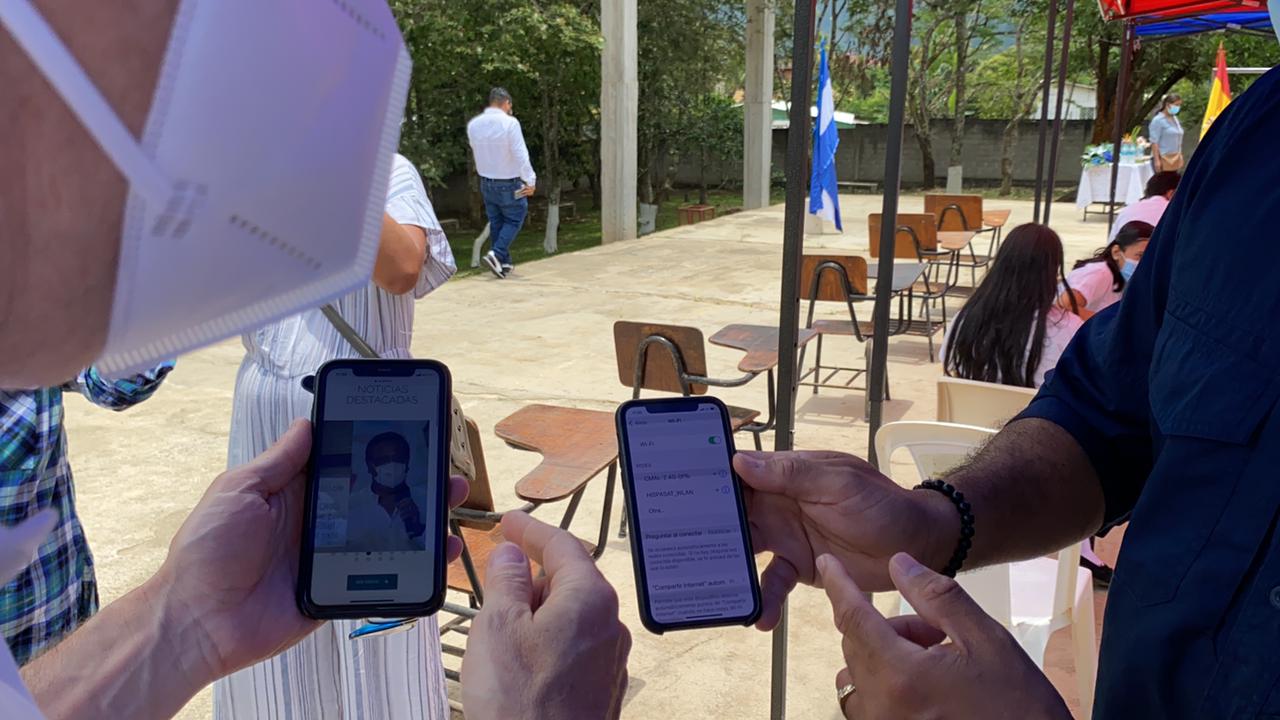The Minister of Education of Honduras, Arnaldo Bueso, the Spanish Ambassador in Honduras, Guillermo Kirkpatrick, and HISPASAT’s Chief Commercial Officer, Ignacio Sanchis, inaugurated yesterday the connectivity and remote education service donated by the Spanish satellite telecommunications operator of the Red Eléctrica Group to 15 schools and rural communities in the country with a visit to a school in the department of Comayagua. This donation, the result of public-private cooperation, comes from an agreement with the Secretary of Education of Honduras in the framework of humanitarian aid that Spain has earmarked for the Central American country to alleviate the devastation caused by hurricanes Eta and Iota at the end of 2020.
 Specifically, HISPASAT has provided all the equipment required to roll out 15 satellite hotspots located in different departments in the country, as well as a remote education solution that allows educational contents to be downloaded and accessed on local servers so that students can use them effectively. This solution provides a WiFi network in each school and also includes a community WiFi hotspot that provides Internet access to the residents of these rural communities. HISPASAT is also care of the installation and maintenance costs for this service, which will last for nine months.
Specifically, HISPASAT has provided all the equipment required to roll out 15 satellite hotspots located in different departments in the country, as well as a remote education solution that allows educational contents to be downloaded and accessed on local servers so that students can use them effectively. This solution provides a WiFi network in each school and also includes a community WiFi hotspot that provides Internet access to the residents of these rural communities. HISPASAT is also care of the installation and maintenance costs for this service, which will last for nine months.
The devastation brought on by last year’s hurricanes led to the evacuation of half a million people and left 330,000 people without communications and half the country’s students without an Internet connection. In disasters like these, satellite technology is a key tool to speed up re-establishing communications. The use of satellites is also essential for training on tools and digital skills in countries like Honduras, in which rural schools frequently lack Internet access through land-based or mobile networks.
Commitment to education in Honduras
The Minister of Education, Arnaldo Bueso, explained that the government of Honduras is promoting major initiatives as part of its commitment to quality education. “We are united as a society and we are grateful for the help from all the participants involved: The central government, businesspeople, technical teams, partners, civil society, fathers and mothers, teachers, churches, local governments and many others who, undoubtedly, are committed to the future of thousands of students”, he stated.
Furthermore, he showed his appreciation to the Spanish Agency for International Development Cooperation and to HISPASAT for supporting these initiatives and how students can now have the right to access to quality education, especially certain remote parts of the country where there is a lesser degree of technological infrastructure. “Today we continue to face major challenges, with a raging pandemic and in-person education that is becoming more difficult to maintain every day. We want our students to stay in school and keep studying to achieve their dreams and improve their quality of life”, he explained.
For his part, Ambassador Kirkpatrick stated: “The school closings in Honduras due to the pandemic, aggravated by hurricanes Eta and Iota, have highlighted the need to promote digital education. That’s why we need to overcome the digital divide, especially in rural and remote areas of the country and to modernize the educational systems, providing training to educators, parents and students. The Spanish Agency for International Development Cooperation is promoting an educational project that combines humanitarian action in the short term, early recovery in the medium term and long-term rebuilding with digital transformation, including promoting public-private partnerships to support initiatives that make digital education accessible for everyone without leaving anyone behind.”
“HISPASAT is fully committed to the role that satellites play in addressing situations like the one in Honduras. But we don’t want this connectivity solution to be used only for re-establishing communications in these 15 schools, we also want it to contribute to effectively bridging the digital divide in education, which is truly an essential service”, added the company’s Chief Commercial Officer, Ignacio Sanchis.
HISPASAT works in collaboration with the Spanish Agency for International Development Cooperation (AECID) on a variety of initiatives to provide satellite connectivity to schools and rural communities in Latin America and to promote quality education in remote, disadvantaged areas.
Related Articles:
HISPASAT and Gilat Renew and Expand their Contract to Offer Cellular Backhaul Services in the US
HISPASAT renews its collaboration with Fundación ATRESMEDIA
Altán’s Red Compartida to Multiply Base Stations Connected through HISPASAT’s Ka-band





